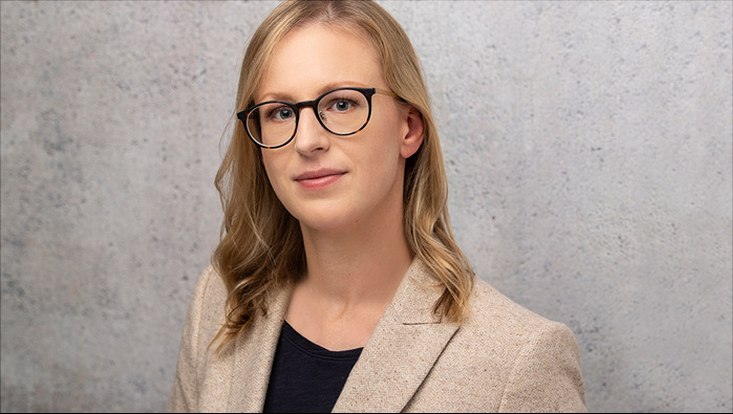Dr. Annika Hildebrandt

Photo: Studio Monbijou
Curriculum
Annika Hildebrandt is a literary scholar specializing in the relationship between literature and society since the 18th century, the aesthetics of political literature, and theories of authorship.
She studied German and Latin literature. From 2013 to 2016, she was a member of the SFB 644 „Transformations of Antiquity" at the Humboldt University of Berlin, where she received her Ph.D. in 2017. She was a postdoctoral researcher at the Karl-Franzens-University Graz from 2017 to 2018 and at the University of Siegen from 2018 to 2021. Since 2021, she researches and teaches at the Institute for German Studies, Comparative Literature and Cultural Studies at the Rheinische Friedrich-Wilhelms-University in Bonn.
Her dissertation on war literature in the German Enlightenment was awarded with the Scherer Prize in 2018. In her habilitation project, she examines the fascination with self-taught poets in German literature from the early modern period to the present and analyzes their function for literary theory. One focus is on the poetics of workers’ poetry in the 19th and 20th centuries.
Publications (selection)
- Der Sänger als Produzent. Stimme und Intervention in Hanns Eislers Konzept des revolutionären Kampflieds. In: Geistesgegenwart und Nachdenklichkeit. Kleine Formen der Intervention. Special issue Kulturwissenschaftliche Zeitschrift (2024) [forthcoming].
- Ed. with Roman Widder: Fürsprache. Subalterne Literatur seit der Volksaufklärung. Special issue Zeitschrift für Germanistik N. F. 34:1 (2024).
- Ed. with Eva Axer and Kathrin Wittler: Schreibarten im Umbruch. Stildiskurse im 18. Jahrhundert. Berlin 2024 (= Beihefte zur Zeitschrift für deutsche Philologie 23).
- Neue Menschen, neue Poeten. Expressionismus, Genie und Arbeiterdichtung. In: ‚Genie‘ in der Nachromantik. Special issue German Life and Letters 75:3 (2022), pp. 430–447.
- Beobachtete Begeisterung. Ungelehrtes Dichten und Geniekonzept im 18. Jahrhundert. In: Deutsche Vierteljahrsschrift für Literaturwissenschaft und Geistesgeschichte 95:1 (2021), pp. 23–41.
- Die Mobilisierung der Poesie. Literatur und Krieg um 1750. Berlin, Boston 2019.
Research project: Aesthetic Class Struggle. Force in Concepts of Workers‘ Poetry around 1900
The project focuses on the aesthetic concept of ‚force‘ in the language of workers‘ poetry, which is contrasted in poetological discourse around 1900 with the supposedly weak, decadent literature of the bourgeoisie. From the 1860s, the early workers' movement used poetic language as a means of political resistance. In the 20th century, however, class struggle was transferred to cultural and poetic theory. This idea was expressed not only by politicians from the German workers' parties (Clara Zetkin, Franz Mehring) and a network of young proletarian writers (Gerrit Engelke, Karl Bröger). Bourgeois critics also explored the aesthetics of a future-oriented Arbeiterdichtung (Julius Bab, 1924).
A key category of these programs is an aesthetic force that combines literary and social resistance. The project aims to explore this class-specific force by examining its historical context. The focus will be on the following discourses relevant to both aesthetic and socio-political thought around 1900: 1) primitivism, which was used to parallel the 'forceful' art of so-called primitive peoples and workers; 2) economic studies, which discussed the creative potential of the rhythms of physical labor; 3) discourses on the relationship between man and machine, which provoked new ideas about the 'force' of the proletarian body and language.
Research results: Aesthetic Class Struggle. Force in Concepts of Workers‘ Poetry around 1900
The dichotomous attribution of force and weakness to social classes was fundamental to approaches to proletarian literary aesthetics around 1900. My project demonstrated the close intertwining of the emerging poetics of working-class poetry and fin de siècle discourses on decadence, which these literary programs referred to antagonistically. Key political figures in German social democracy interpreted the literary preoccupation with phenomena of dwindling force (e.g., cultural, physical, and mental) as a sign of the bourgeoisie’s decline, attributing resources of cultural force to the proletariat. This sparked a broader discourse on working-class poetry.
Against the backdrop of a 'weak' bourgeoisie and a 'strong' proletariat, the aesthetics of force in working-class poetry manifested in various ways. My project showed how social democratic figures, such as Clara Zetkin and Franz Mehring, combined Marxist historical narratives, including the rise and fall of classes, with vitalist notions of life force. In contrast, bourgeois literary critic Julius Bab explained the "Formkraft" of workers’ poetry through a mechanical translation of technical forces into literature. This aligned him closely with the human-machine concepts of the Werkleute Nyland in Westphalia.
At the same time, a reference to primitivist aesthetics was relevant across discourses because it linked workers’ poetry to the primal forces found in indigenous art, a source of inspiration for many modern visual art movements. This finding establishes an unexpected relationship between the aesthetics of force in working-class poetry and artistic modernism. This topic will be further explored in a lecture at the 2026 conference, "Die Kraft der Avantgarden."
